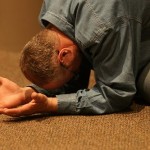Dr. James White writes:
How Reliable Is Roman Catholic History? An Example in a Recent Edition of This Rock Magazine
Roman Catholic apologists are going about the land presenting seminars and talks in parish halls and church buildings, all designed to 1) confirm the faithful in their allegiance to Rome and the Papacy, and 2) invite the “separated brethren home to Mother Church.” While the number of RC apologists has grown exponentially over the past decade, the one gentleman who has been out-front, or maybe better, in light of the article we will be reviewing, “up-front,” the longest, is Karl Keating, president of Catholic Answers.
In a recent article in the December, 1996 edition of This Rock magazine, Keating introduces his readers to Liber Pontificalis, The Book of Pontiffs. Keating doesn’t give his readers much background on the book. I quote from J.N.D. Kelly, who describes the work:
A collection of papal biographies from St Peter to Pius II (d. 1464), compiled in its first redaction in the middle of the 6th cent. and extended by later hands. While much of the material embodied, especially in the earlier section, is apocryphal, the work is in the main based on valuable sources, and while it is often biased it is indispensable for the history of the papacy (J.N.D. Kelly, The Oxford Dictionary of Popes, (1986), xi).
One is struck by the fact that Keating, despite an early acknowledgement of some factual problems with the work, accepts every word of Liber Pontificalis that he quotes as if it were solid history, and he is dealing with the very first stories of the first Popes-material Kelly specifically identifies as mainly “apocryphal.” Keating notes,
Not all of the lives are reliable, it should be noted. The Liber Pontificalis needs to be supplemented with information from other ancient texts. In the best-known error, the compiler lists the fifth pope as Aneclitus, who turns out really to have been the same man as the third pope, Cletus, who also was known as Anencletus. The mix-up must have been because of the dual name.
Aside from the uncritical use of Liber Pontificalis, the main focus of our criticism of Mr. Keating’s article will center upon the issues raised by the letter commonly identified as Clement’s Epistle to the Corinthians. I quote from Keating:
There is no disputing, though, the identity of the “intervening” pope, Clement, known to history as Clement of Rome and the author of an epistle, addressed to the Corinthians, that is used by Catholic apologists to show the early exercise of papal authority.
We note that it is Keating himself who acknowledges the use of this epistle by Catholic apologists. It is indeed often used to present an “early exercise of papal authority.” What kind of authority? Keating continues:
It seems that the Corinthians had called on Clement to settle a dispute (the poor Corinthians were still troubled, long decades after Paul had tried to straighten them out — apparently with insufficient success). The last surviving apostle, John, lived much closer to them and would have been the logical adjudicator, but they didn’t write to him. They wrote to the successor of the chief apostle, and Pope Clement replied in tones of authority.
While Keating moves on to other issues, dwelling mainly on speculations based upon the apocryphal stories contained in Liber Pontificalis, I would like to provide the reader with a much more accurate view of this supposed “early exercise of papal authority” that is so easily assumed by Roman apologists. What is the truth about Clement’s epistle to the Corinthians? Does it, indeed, provide us with a first century example of papal supremacy?
Let’s Look at the Facts
First and foremost, there is tremendous confusion concerning the early “lists” of the bishops of Rome, and for good reason. Different sources give different renderings. Why? As simple as it may sound, the reason is easily discovered: no one really cared for the first century of the history of the church at Rome. All the lists come from at the earliest many decades later, and show a concern that did not arise until the Church as a whole began struggling with heresy and began formulating concepts of authority to use against heretics. But in those first decades, even into the middle of the second century, no one was particularly concerned about who the bishop of Rome was. Why? Because no one had the concepts that Rome now presents as “ancient.” No one thought the bishop of any one church was above any other, or that the bishop of Rome was somehow invested with any particular authority.
No Monarchical Episcopate
What’s more, there is a fatal historical fact that is overlooked consistently by Roman Catholic apologists. Joseph F. Kelly in his The Concise Dictionary of Early Christianity (The Liturgical Press, 1992), p. 2, notes,
The word “pope” was not used exclusively of the bishop of Rome until the ninth century, and it is likely that in the earliest Roman community a college of presbyters rather than a single bishop provided the leadership.
J.N.D. Kelly likewise notes this reality:
In the late 2nd or early 3rd cent. the tradition identified Peter as the first bishop of Rome. This was a natural development once the monarchical episcopate, i.e., government of the local church by a single bishop as distinct from a group of presbyter-bishops, finally emerged in Rome in the mid-2nd cent. (p. 6).
When speaking of Linus, Anacletus, Clement, Evaristus, Alexander, Telesphorus, and Hyginus (to A.D. 142), Kelly consistently notes the same thing: there was no monarchical episcopate in Rome at this time! Only with Hyginus does he say that the monarchical episcopate is beginning to emerge, and does so with Pius 1, 142-155 A.D.
What does this mean? Well, it’s pretty hard for there to be an exercise of “papal authority” when there is no papacy! The primitive form of church government found in Rome is the biblical one: a plurality of elders. What is more, this is the same form of government plainly portrayed in the epistle Mr. Keating makes reference to! We note Kelly’s words again concerning Clement:
The claim that he died a martyr, supported by LP [i.e., Liber Pontificalis, the work Keating is citing from] and the canon of the mass, should be rejected in view of the silence of the earliest authorities; the story, too, that he was banished to the Crimea, successfully preached the gospel there, and was killed by being drowned with an anchor around his neck, is without foundation. Almost the only reliable information that survives about him is that he was responsible for, probably author of, the so-called First Epistle of Clement, the most import ant 1st cent. Christian document outside the N.T. It was a letter of remonstrance addressed c.96 to the church at Corinth (where fierce dissensions had broken out and some presbyters had been deposed) which Clement probably drafted as the leading presbyter-bishop. After setting out the principle on which the orderly succession of bishops and deacons rests and tracing it back to Jesus Christ, it called for the reinstatement of the extruded presbyters. The letter is the earliest example of the intervention, fraternal but authoritative, of the Roman church, though not of the pope personally, in the affairs of another Church. Widely read in Christian antiquity, it was sometimes treated as part of the NT canon.
While Clement’s position as a leading presbyter and spokesman of the Christian community at Rome is assured, his letter suggests that the monarchical episcopate had not yet emerged there, and it is therefore impossible to form any precise conception of his constitutional role (p. 8).
A few things should be noted. First, Kelly recognizes that we are not even certain when the letter was written, nor that Clement himself wrote it. Secondly, he points out that the letter indicates a plurality of elders, not a monarchical episcopate, existing in Rome at this time. Thirdly, and very importantly, the points out that the letter remonstrating with the Corinthians is not a papal letter, but a letter from the church at Rome.
The Church at Rome, not the Bishop at Rome
The simple historical fact is that the early examples of Roman power are not of the bishop of Rome but of the church at Rome. The prestige of the bishop developed from the prestige of the church abiding at the capital of the Roman Empire. Modern Roman dogma has it backwards: the prestige of Rome does not come from having the “Successor of Peter” within her: the bishop of Rome gained his prestige because of the geographical and political location of the church itself! J.B. Lightfoot, writing in the last century (prior to much of the research that has demonstrated the later rise of the monarchical episcopate) notes:
There is all the difference in the world between the attitude of Rome towards other churches at the close of the first century, when the Romans as a community remonstrate on terms of equality with the Corinthians on their irregularities, strong only in the righteousness of their cause, and feeling as they had a right to feel, that these counsels of peace were the dictation of the Holy Spirit, and its attitude at the close of the second century, when Victor the bishop excommunicates the Churches of Asia Minor for clinging to a usage in regard to the celebration of Easter which had been handed down to them from the Apostles, and thus foments instead of healing dissensions….Even this second stage has carried the power of Rome only a very small step in advance towards the assumptions of a Hildebrand or an Innocent or a Boniface, or even of a Leo: but it is nevertheless a decided step. The substitution of the bishop of Rome for the Church of Rome is an all important point. The later Roman theory supposes that the Church of Rome derives all its authority from the bishop of Rome, as the successor of S. Peter. History inverts this relation and shows that, as a matter of fact, the power of the bishop of Rome was built upon the power of the Church of Rome (The Apostolic Fathers Vol 1:70).
Other Early Witnesses
Early documents from the history of the Church make this even more plain. The 35th canon of the Apostolic Canons (dated from the 2nd to 5th centuries) says:
The bishops of every country ought to know who is the chief among them, and to esteem him as their head, and not to do any great thing without his consent; but every one to manage only the affairs that belong to his own parish, and the places subject to it. But let him not do anything without the consent of all; for it is by this means there will be unanimity, and God will be glorified by Christ, in the Holy Spirit.
Likewise, the Council of Nic?a’s 6th canon read:
Let the ancient customs in Egypt, Libya, and Pentapolis prevail, that the Bishop of Alexandria have jurisdiction in all these, since the like is customary for the Bishop of Rome also. Likewise in Antioch and the other provinces, let the Churches retain their privileges.
And a full three and a half centuries after Clement’s epistle, an ecumenical council at Chalcedon could clearly recognize why Rome had the prerogatives she did, as seen in the 28th canon of Chalcedon:
Following in all things the decisions of the holy Fathers, and acknowledging the canon, which has been just read…we also do enact and decree the same things concerning the privileges of the most holy Church of Constantinople, which is New Rome. For the Fathers rightly granted privileges to the throne of old Rome, because it was the royal city. And the One Hundred and Fifty most religious Bishops, actuated by the same consideration, gave equal privileges to the most holy throne of New Rome, justly judging that the city which is honored with the Sovereignty and the Senate, and enjoys equal privileges with the old imperial Rome, should in ecclesiastical matters also be magnified as she is, and rank next after her.
When Ignatius wrote to the Romans, he not only did not address any one bishop (for there was no single bishop in Rome at the time), but he spoke of the “presidency” of Rome being one of love and honor, not universal jurisdiction, prompting Lightfoot to comment,
…this then was the original primacy of Rome-a primacy not of the bishop but of the whole church, a primacy not of official authority but of practical goodness, backed however by the prestige and the advantages which were necessarily enjoyed by the church of the metropolis.
Throughout the Epistle of Clement, the first person plural “we” is used, never “I.” Clement does not speak as a Pope, does not “remonstrate” as a Pope. Instead, the church at Rome writes as a fellow and equal body of believers. This is the verdict of any honest, unbiased reading of the epistle.
The Power of Roman Anachronism
To read Papal prerogatives into Clement’s epistle is to demonstrate what happens when you find yourself bound under the following dogmatic belief from Vatican I:
…we, therefore, for the preservation, safe-keeping, and increase of the Catholic flock, with the approval of the sacred Council, do judge it to be necessary to propose to the belief and acceptance of all the faithful, in accordance with the ancient and constant faith of the universal Church, the doctrine touching the institution, perpetuity, and nature of the sacred Apostolic Primacy…
At open variance with this clear doctrine of Holy Scripture as it has been ever understood by the Catholic Church are the perverse opinions of those who, while they distort the form of government established by Christ the Lord in his Church, deny that Peter in his single person, preferably to all the other Apostles, whether taken separately or together, was endowed by Christ with a true and proper primacy of jurisdiction;
The Roman Catholic apologist, bound to such a claim that runs directly in the face of history itself, has to balance the demands of faith in the Papacy with simple honesty in historical research. Sadly, allegiance to Rome normally wins out. Keating doesn’t mention any of the historical facts about Clement’s epistle mentioned above. He allows the claim that this is an early exercise of Papal power to stand without comment. Yet, such a claim is, in reality, nothing more than an act of blind faith, made with eyes firmly closed to the historical realities themselves.
Roman supremacy developed over time, beginning with the geographical, social, and political advantages associated with being in the capital of the Empire. Rome was the only Western apostolic see; the East had multiple apostolic sees, including Alexandria, Jerusalem, Antioch, and eventually Constantinople as well. It is hardly a coincidence that Rome and Eastern Orthodoxy to this day demonstrate in their ecclesiology the very differences one would expect to arise from the facts of history: Rome demanding allegiance to one, centralized authority in the bishop of Rome, while Orthodoxy, forced by history to deal with multiple centers of authority, presents a concept of “collegiality.”
When Rome the Empire fell, the bishop of Rome stepped into the vacuum, and the rest, as they say, is “history.” But to make this historical development one that was intended by Christ and implemented by the Apostles, is to read into history a reality that is not only absent, but is contrary to the actual facts.



